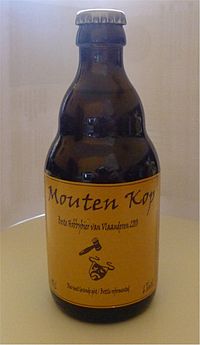
Beer is one of the oldest and the most widely consumed alcoholic drink in the world. The third most popular drink overall after water and tea - it is produced by the brewing and fermentation of starches, mainly derived from cereal grains—most commonly from malted barley, though wheat, maize (corn), rice, and oats are also used. During the brewing process, fermentation of the starch sugars in the wort produces ethanol and carbonation in the resulting beer. Most modern beer is brewed with hops, which add bitterness and other flavours and act as a natural preservative and stabilizing agent. Other flavouring agents such as gruit, herbs, or fruits may be included or used instead of hops. In commercial brewing, the natural carbonation effect is often removed during processing and replaced with forced carbonation.

Brewing is the production of beer by steeping a starch source in water and fermenting the resulting sweet liquid with yeast. It may be done in a brewery by a commercial brewer, at home by a homebrewer, or communally. Brewing has taken place since around the 6th millennium BC, and archaeological evidence suggests that emerging civilizations, including ancient Egypt and Mesopotamia, brewed beer. Since the nineteenth century the brewing industry has been part of most western economies.

Homebrewing is the brewing of beer or other alcoholic beverages on a small scale for personal, non-commercial purposes. Supplies, such as kits and fermentation tanks, can be purchased locally at specialty stores or online. Beer was brewed domestically for thousands of years before its commercial production, although its legality has varied according to local regulation. Homebrewing is closely related to the hobby of home distillation, the production of alcoholic spirits for personal consumption; however home distillation is generally more tightly regulated.
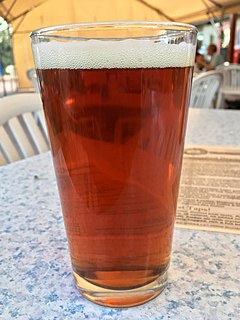
Pale ale is a golden to amber coloured beer style brewed with pale malt. The term first appeared around 1703 for beers made from malts dried with high-carbon coke, which resulted in a lighter colour than other beers popular at that time. Different brewing practices and hop quantities have resulted in a range of tastes and strengths within the pale ale family.

Wheat beer is a top-fermented beer which is brewed with a large proportion of wheat relative to the amount of malted barley. The two main varieties are German Weizenbier and Belgian witbier; other types include Lambic, Berliner Weisse, and Gose.

Brown ale is a style of beer with a dark amber or brown colour. The term was first used by London brewers in the late 17th century to describe their products, such as mild ale, though the term has a rather different meaning today. 18th century brown ales were lightly hopped and brewed from 100% brown malt.

Smoked beer is a type of beer with a distinctive smoke flavour imparted by using malted barley dried over an open flame.
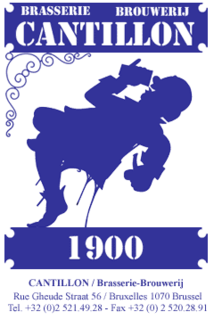
Brasserie-Brouwerij Cantillon is a small Belgian traditional family brewery based in Anderlecht, Brussels. Cantillon was founded in 1900 and brews exclusively lambic beers.

In brewing, adjuncts are unmalted grains or grain products used in brewing beer which supplement the main mash ingredient. This is often done with the intention of cutting costs, but sometimes also to create an additional feature, such as better foam retention, flavours or nutritional value or additives. Both solid and liquid adjuncts are commonly used.

Beer in the United States is manufactured by more than 7,000 breweries, which range in size from industry giants to brew pubs and microbreweries. The United States produced 196 million barrels (23.0 GL) of beer in 2012, and consumes roughly 28 US gallons (110 L) of beer per capita annually. In 2011, the United States was ranked fifteenth in the world in per capita consumption, while total consumption was second only to China.

Maes pils is a Belgian pils brewed by Alken-Maes. The beer was first produced in 1930 for Antwerp's Universal Exposition and called Prima Maezenbier. After Jupiler and Stella Artois, it is the third best-selling pilsner in Belgium.
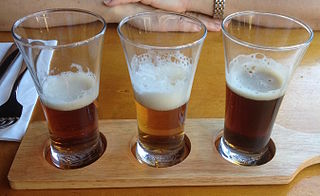
Beer styles differentiate and categorise beers by colour, flavour, strength, ingredients, production method, recipe, history, or origin.
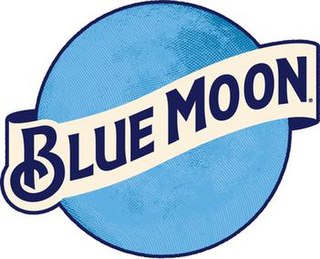
Blue Moon Belgian White is a Belgian-style witbier brewed by MillerCoors under the name the Blue Moon Brewing Co. It was launched in 1995, and was originally brewed in Golden, Colorado.
Dave Line was a British beer author. An electrical engineer by profession, he is regarded as a pioneer in homebrewing during the 1970s because at the time homebrewing as a hobby was in its infancy. At the time of his early death from cancer he was 37, living in Southampton, was married and had a son.

Mash ingredients, mash bill, mashbill, or grain bill are the materials that brewers use to produce the wort that they then ferment into alcohol. Mashing is the act of creating and extracting fermentable and non-fermentable sugars and flavor components from grain by steeping it in hot water, and then letting it rest at specific temperature ranges to activate naturally occurring enzymes in the grain that convert starches to sugars. The sugars separate from the mash ingredients, and then yeast in the brewing process converts them to alcohol and other fermentation products.
Willow Springs Distilling Company was a brewery located in South Omaha, Nebraska. Part of a national conglomerate, Willow Springs was Nebraska's first distillery, and grew to become the nation’s third largest distillery before the Great Depression. Willow Springs was one of the "Big 4" brewers located in Omaha, which also included the Krug, Storz and Metz breweries.
Dupont Brewery is a brewery in Tourpes (Leuze-en-Hainaut), in western Hainaut, Belgium. Founded in 1950, it is on a working farm which dates back to 1759 and has significant brewing history. In the 1990s, a bread bakery and cheese-making facility were added.

Alvinne is a small brewery in the hamlet of Moen near the Belgian city of Zwevegem, founded in 2002.
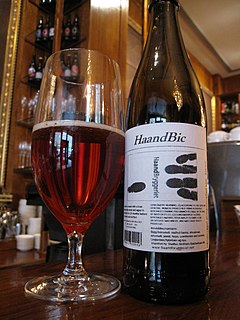
Sour beer, also known as Sours, is beer which has an intentionally acidic, tart, or sour taste. Traditional sour beer styles include Belgian lambics, gueuze and Flanders red ale, and German gose and Berliner Weisse.
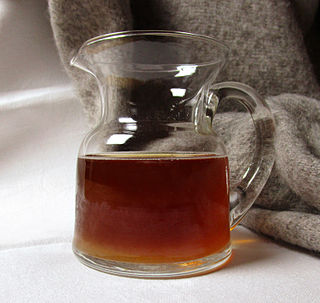
Gotlandsdricka is a traditional homebrewed alcoholic beverage made on the island of Gotland, Sweden. It is a kind of ale, closely related to the Finnish sahti, and Norwegian Maltøl with a smoky, bitter-sweet, spicy (juniper) flavor. It is similar to gruit.
